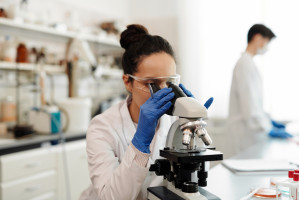
Cancerous tumours are made up of rapidly growing, abnormally shaped, cells that can infiltrate and destroy healthy tissues, travel to other parts of the body, and form additional tumours.
In part because of its rapid and invasive nature, cancer remains the second leading cause of death in the United States and a major cause of death worldwide.
Tumour formation is often driven by genes called oncogenes, which are usually involved in the normal processes of cell growth, proliferation, and death.
But they can also mutate and be expressed at high levels, which can drive the multiplication of cancerous cells.
Mutated oncogenes work in various ways, including on target cells’ chromatin, compact, dense structures of DNA and selected protein molecules.
Oncogenes also work with an extensive variety of protein complexes that help turn specific genes “on” or “off” by binding to certain regions of the DNA.
The most well-known oncogene is Kras.
Mutant Kras is found in 20% of all human cancers, including 97% of pancreatic ductal, 45% of colorectal, and 30% of lung cancers.
Despite the attention focused on mutant Kras tumour formation, the question remains as to why Kras mutation is so essential for oncogenesis.
The conventional wisdom is that Kras mutation simply promotes cell proliferation.
However, as many genes can promote cell proliferation, what makes Kras so deadly and difficult to treat?
A collaborative team that includes researchers from the Terasaki Institute for Biomedical Innovation (TIBI) and Duke University led by Dr. Xiling Shen, a professor and the chief scientific officer of TIBI, has been able to shed light on these processes.
In a recent study, published in Developmental Cell, they discovered that Kras mutation causes rearrangements of chromatin inside cells.
This rearrangement causes tissue cells to revert to an early developmental, or “stem-like” state and erroneously start to regenerate “new tissue,” causing the onset of tumour formation.
The team revealed that Kras-induced chromatin remodelling was mediated by a protein complex called AP-1, which binds and opens chromatins to rewire the cell’s fate.
The AP-1 mediated chromatin accessibility mechanism seems to be a common process in tumour initiation, including in the lung, skin, and intestine.
The team demonstrated that small-molecule drugs inhibiting AP-1 deterred oncogenesis and cell proliferation, providing a promising way to treat Kras-mutant tumours.
This is especially significant because, currently, the majority of Kras tumours are not treatable with drugs.
What is even more fascinating is that Kras/AP-1 induced chromatin remodelling instils plasticity, or the ability to assume different cellular characteristics in response to mutations.
Hence, Kras-mutant cells from different origins such as alveolar cells in the lungs and club cells in the airway will start masking their cell identity and become alike to one another.
This sheds new light on the question of how lung cancer originates.
According to Dr. Shen, “Our study demonstrates the ability of Kras to use genetic reprogramming to make cells more stem-like and plastic; it resolves the long-standing debate over why Kras is so special in tumour formation. Our elucidation of the AP-1 complex as its effector for chromatin remodelling opens new therapeutic opportunities to target Kras, a notoriously hard-to-drug target.”
“An understanding of the complex processes involved in tumourigenesis is essential for designing drug treatments and screening platforms for cancer,” said TIBI Director and CEO, Ali Khademhosseini, PhD. “Dr. Shen’s work will prove invaluable in meeting those needs and will dovetail with the drug delivery and physiological models platforms that we have here at the institute.”